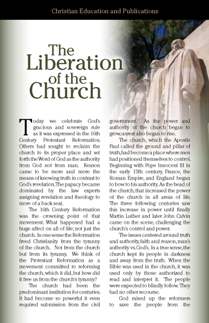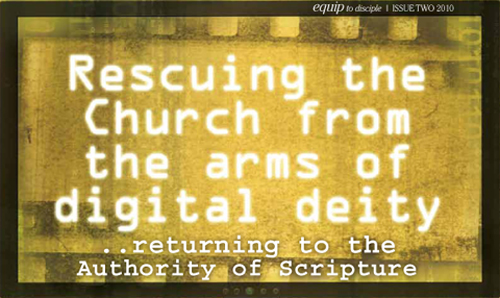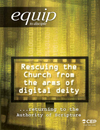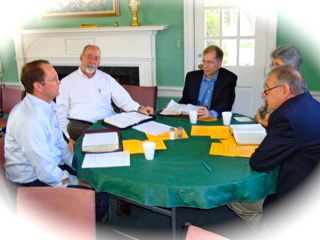 The 2010 Reformation Inserts are here! This year we celebrate Reformation Sunday on October 31st. Reformation Sunday is a time to celebrate our theological roots. It is a great opportunity to educate our congregations on the importance of what the Reformers did and the implications that it has for us today.
The 2010 Reformation Inserts are here! This year we celebrate Reformation Sunday on October 31st. Reformation Sunday is a time to celebrate our theological roots. It is a great opportunity to educate our congregations on the importance of what the Reformers did and the implications that it has for us today.
This year’s insert focuses on the Liberation of the Church. The insert explains how the church had reached a point that was outside of God’s creation design for it, and had actually even come to have a tyrannical hold on Christianity. To read more about how God sovereignly has worked through history to redeem his people, click here to read the entire text of the insert.


 I don’t mean to sound overdramatic, but we simply cannot bury our heads in our X-Boxes. As numerous studies attest, the relentless acquisition of cutting edge digital technology now lords over the Western cultural heart, extending across ethnic, gender, economic, and social boundaries. We must pause between texts, emails, and Seinfeld episodes to face the fact that technological lordship vies for the worship of God’s people in ourchurches. For too many, the knee is already bowed.
I don’t mean to sound overdramatic, but we simply cannot bury our heads in our X-Boxes. As numerous studies attest, the relentless acquisition of cutting edge digital technology now lords over the Western cultural heart, extending across ethnic, gender, economic, and social boundaries. We must pause between texts, emails, and Seinfeld episodes to face the fact that technological lordship vies for the worship of God’s people in ourchurches. For too many, the knee is already bowed. actually seek to preach the Bible? Recently in a worship service I attended at a Reformed church, which staunchly defends the inerrancy and sufficiency of Scripture, the preacher apologized two times for reading the Bible to the congregation. He was serious. The very Word he heralded as both authoritative and relevant required pardon from the congregation for its reading! Why? Perhaps because he knows his Blackberry and YouTube crowd might get bored listening to biblical texts. Or perhaps because he subconsciously doubts the power of the Word of God to do what God claims – to accomplish its purpose even in the heart of one in the embrace of the digital goddess. Whatever the case, in one tragic moment, he affirmed what many media-drunk churchgoers have come to believe: that public reading of Scripture, which the Apostle Paul alerts Timothy not to neglect (1 Tim 4:13), is a necessary boredom to endure; that preaching Scripture is an irrelevant part of our church experience.
actually seek to preach the Bible? Recently in a worship service I attended at a Reformed church, which staunchly defends the inerrancy and sufficiency of Scripture, the preacher apologized two times for reading the Bible to the congregation. He was serious. The very Word he heralded as both authoritative and relevant required pardon from the congregation for its reading! Why? Perhaps because he knows his Blackberry and YouTube crowd might get bored listening to biblical texts. Or perhaps because he subconsciously doubts the power of the Word of God to do what God claims – to accomplish its purpose even in the heart of one in the embrace of the digital goddess. Whatever the case, in one tragic moment, he affirmed what many media-drunk churchgoers have come to believe: that public reading of Scripture, which the Apostle Paul alerts Timothy not to neglect (1 Tim 4:13), is a necessary boredom to endure; that preaching Scripture is an irrelevant part of our church experience. The Imaginative Learner that we looked at last time asks the question – Why? Why must we learn this information. Likewise, the Analytic Learn asks his/her own question – What? What are the facts here? What information can I learn from this lesson?
The Imaginative Learner that we looked at last time asks the question – Why? Why must we learn this information. Likewise, the Analytic Learn asks his/her own question – What? What are the facts here? What information can I learn from this lesson?

 We like information presented logically and sequentially. This is very western, unlike the other 2/3 of the world that is more interested in the story and the happening than the time. It is hard to teach many subjects in any way except chronologically, so we must use stories and illustrations to make them more understandable to all learners. (We all learn from stories and illustrations – it is the part of the sermon we remember the best.)
We like information presented logically and sequentially. This is very western, unlike the other 2/3 of the world that is more interested in the story and the happening than the time. It is hard to teach many subjects in any way except chronologically, so we must use stories and illustrations to make them more understandable to all learners. (We all learn from stories and illustrations – it is the part of the sermon we remember the best.) At our church we’re on our fifth cycle of the Covenant Story Seminar. About half the congregation has taken it. We like to think of CSS as establishing a Christian Education baseline after which other courses become more useful. We want people to view the grand panorama of God’s grace, to thrill at the discovery of how an event in Genesis or Job enriches what first appears to be a throw-away comment by John or Paul. It’s when they see that God is serious about ushering in a new kingdom that they become serious about personal and cultural changes to be made. Covenant Story participants come to realize that Jesus is far more than a personal friend. He’s the King of glory calling them to conquer along with him all that stands in the way of mercy and justice.
At our church we’re on our fifth cycle of the Covenant Story Seminar. About half the congregation has taken it. We like to think of CSS as establishing a Christian Education baseline after which other courses become more useful. We want people to view the grand panorama of God’s grace, to thrill at the discovery of how an event in Genesis or Job enriches what first appears to be a throw-away comment by John or Paul. It’s when they see that God is serious about ushering in a new kingdom that they become serious about personal and cultural changes to be made. Covenant Story participants come to realize that Jesus is far more than a personal friend. He’s the King of glory calling them to conquer along with him all that stands in the way of mercy and justice.